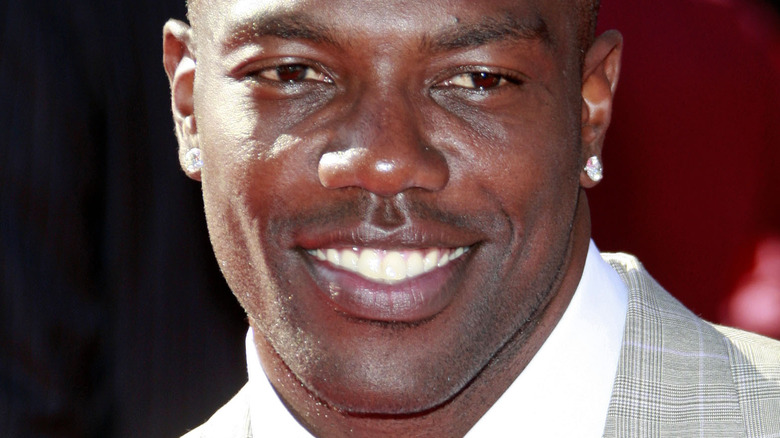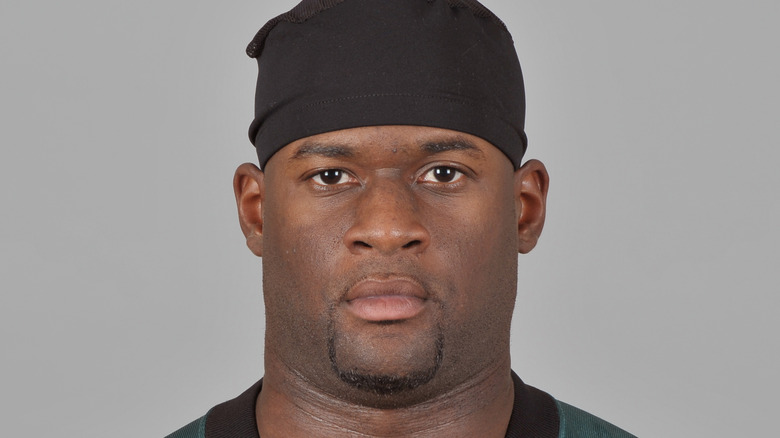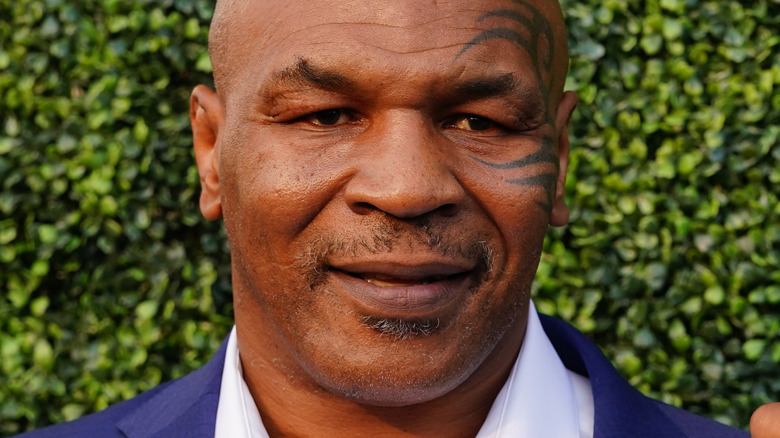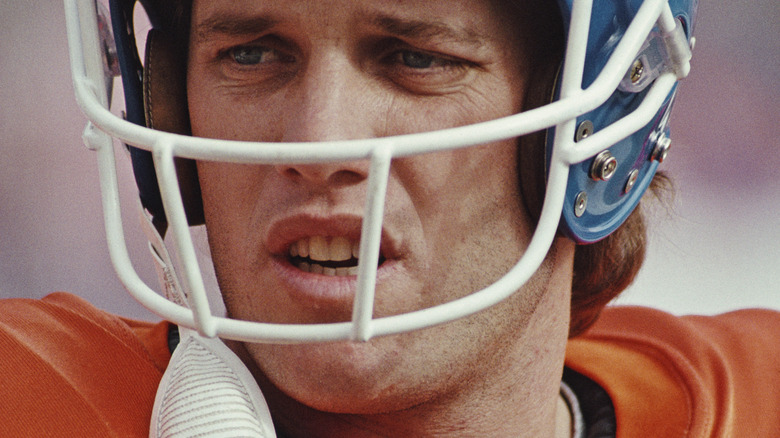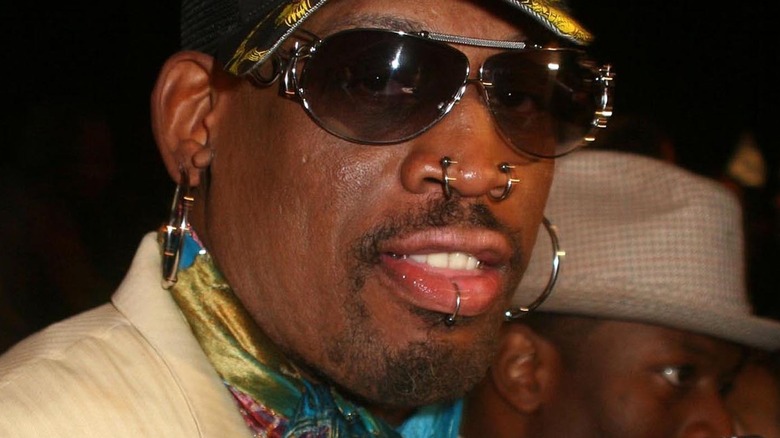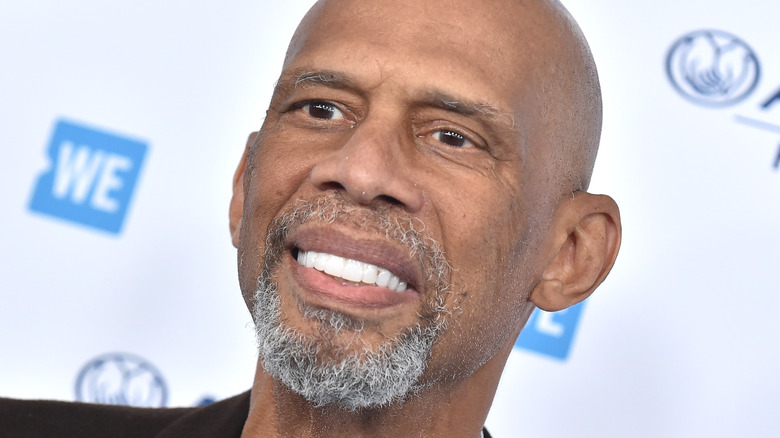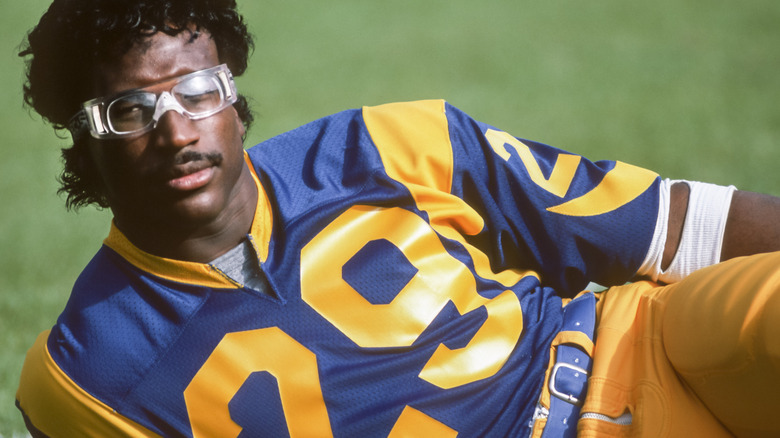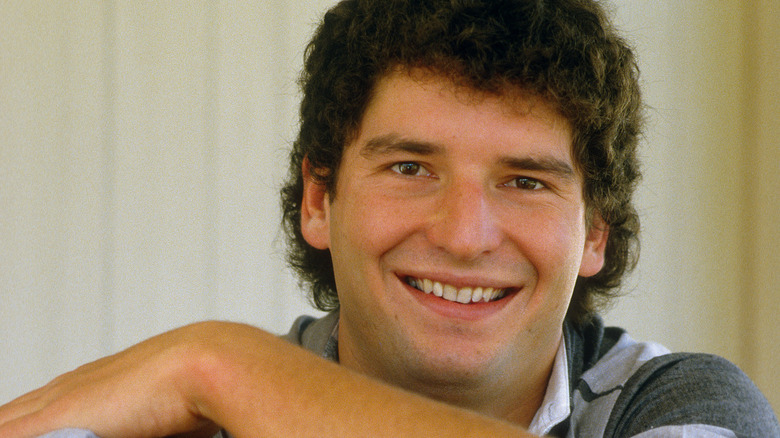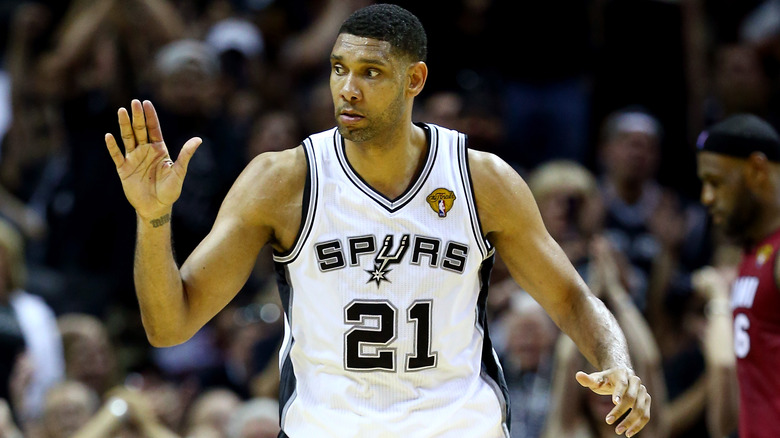Sports Stars Who Were Scammed Out Of Millions
The average NFL career is just over three years, per Statista. Pro football poaches young lions from America's elite colleges during their gladiator primes and briefly makes them very rich. But as injuries inevitably pile up, they're shunted aside for the next class of gridiron warriors.
That also means these fearless young men go from broke college kids to millionaires and right back to broke again, all during a tiny span in their roaring 20s. Two years after leaving the game, 78% of NFL players are flat broke, according to Sports Illustrated. NBA players fare little better.
Mostly, top athletes blow their money all by themselves. But youngsters making millions are also targets for con artists. In 2018, 275-pound, 6'7" NFL defensive end and Penn State grad Carl Nassib started a class for teammates focusing on the power of compound interest. His message was simple: eschew sports cars and risky business ventures, and just save. Carl has a vivid way of framing spending that first big check versus saving it for retirement, per HBO's "Hard Knocks": "When you go to the store and you buy something for ten grand, that's $640,000!" But there simply aren't enough guys like Nassib in the lives of elite athletes. Too often, ballers making millions fall in with financial fraudsters pushing idiotic or outright illegal investments.
Terrell Owens
Terrell Owens is one of the most electric wide receivers in NFL history. His endzone celebrations are iconic. And overall, he's one of the more freakishly talented athletes to ever play the game. Well into retirement, at age 44, he was still throwing down monster dunks at pickup games. At 46 years old, he ran a 4.4-second 40-yard dash, holding his own with one of the fastest men in the NFL as of this writing, Tyreek Hill.
None of T.O.'s outlier abilities mean he's been great with money. The long-time 49er ran a bad route with his cash, he told GQ in 2012. After earning an estimated $80 million, according to Insider, he blew it all. By 2017, a chastened Owens, who ended up worth less than half a million, per Celebrity Net Worth, was preaching to other athletes, "Don't live beyond your means," per Nerd Wallet.
T.O. claims that a big chunk of his fortune was lost to a shady financial advisor. In 2013, Owens sued his high-powered agent, Drew Rosenhaus, according to The Blast. Owens claims his agent introduced him to sketchy money manager Jeff Rubin, who lost him $6.5 million. Rubin also lost $43 million of dozens of NFL players' money on high-risk investments that went belly up, according to CBS News. Rubin was so reckless that the Financial Industry Regulatory Authority banned the money man from any association. However, after a long fight, Owens dropped his suit.
Vince Young
When Vince Young won the college football national championship in 2006 with an eclectic performance, it looked like he was going to be the next big star under center in the NFL. There's an immortal image from the end of that iconic game. Young points to the sky in gratitude as confetti rains down on the Texas Longhorns QB, seeming to portend the endless windfall coming his way.
Young was taken number three overall in that year's NFL Draft and raked in nearly $36 million in player salary during his career, according to Spotrac. But by 2014, Young had already blown through all that cash and filed for bankruptcy, according to a deep-dive profile of the fleet-footed thrower's financial woes by Sports Illustrated.
Young succumbed to the usual temptations of athlete excess: fancy cars, dinner tabs, an entourage that bled him dry. But he says it wasn't all his fault and in 2012 sued both his ex-agent and former financial advisor for fleecing him of $5.5 million, according to ESPN. Young's attorney claims that the two defendants forged the athlete's signature for loans to pay off his agent's personal debts. The suit was settled in Young's favor in 2013, but in 2015, the former QB filed a subsequent suit saying he'd been stiffed out of one of the payments his crooked former money manager owed him. As of this writing, Young's net worth is estimated at negative $1.5 million, per Celebrity Net Worth.
Cristiano Ronaldo
Cristiano Ronaldo didn't lose millions but deserves an honorable mention after being scammed out of some $340,000 by a travel agent in the soccer star's native Portugal, according to the local newspaper Jornal de Noticias.
In 2020, Ronaldo became the first active player in any team sport "to surpass $1 billion in career earnings," according to Forbes. That kind of dough might have meant Ronaldo was a little lax monitoring his credit card statements -– which anachronistically, he'd given to a travel agent. Do those still exist?
In 2021, a 53-year-old Portuguese woman named Maria Silva confessed in court to using the forward's plastic to book roughly 200 trips all over the world for her other less well-heeled clients, per the Mirror. Silva then pocketed the fees directly instead of having them pay the company she worked for. But obviously, don't cry for Cristiano. As Insider points out, this is less than one week's wages for the billion-dollar baller. Silva was, however, given a four-year "suspended sentence," as is common in that country, but was ordered by a Portuguese court to reimburse Ronaldo and the other clients she defrauded. The fraudster moved on to working as a cleaner of some sort.
Mike Tyson
Mike Tyson was vicious inside the ring during his heyday, and his quick reflexes and powerful build made him a tough target to take down. However, his seeming financial naivety made him a target outside of the ring and may have cost him tens of millions of dollars as his business partners bilked the iconic boxer for big bucks.
Tyson tops lots of lists of stars who squandered their fortunes, and the broad strokes are hard to stomach. Despite career earnings of nearly $700 million, by Forbes' accounting, Tyson was broke by 2003, notes The New York Times.
The pugilist's admittedly unwise spending on things like the white tiger he kept inside his own home is well documented. And maybe it's easy to point the finger at a guy with such impulse control issues he once bit off the ear of an opponent. But a lesser told story is the $100 million he says was essentially stolen by his legendary, and infamous, boxing promoter Don King and two managers, according to the AP (via The Seattle Times).
Tyson has filed multiple suits against his various business partners, who he claims took advantage of his lack of savvy. "Everyone in boxing makes out but the fighter," Tyson said in 1997. Court docs indicate King was not merely acting as Tyson's promoter, but also cut himself in for 30% of Iron Mike's earnings, a fraudulent double-dip that violates Nevada Law. The heavy hitter's finances have improved since his bankruptcy but never fully recovered.
John Elway
John Elway was the prototypical NFL pocket passer with all-time great arm strength. He also proved his heart winning his first Super Bowl at nearly 40 years old when the lumbering 6'3" field general, never known for his fleetness of foot, physically helicoptered his way into the end zone –- and into NFL lore.
As great as the hall-of-famer was, Elway also played in the era before NFL salaries exploded. Over his 16 perennial Pro Bowl seasons, the two-time Super Bowl champion and one-time Super Bowl MVP made a relatively pedestrian $45 million in total contractual salary, per Spotrac. For comparison, the NFL's biggest stud under center as of 2021, Patrick Mahomes, will earn that same sum for a single season, according to NFL.com.
Also notable, NFL players, like all major team-sports pro athletes in America, are taxed at the highest federal rate. So when you think of Elway's $45 million, cut that in half, give or take. That makes it all the more crushing that the former Bronco sunk some $15 million into an actual Ponzi scheme, according to The Denver Post. Court docs showed Elway sent the cash to a hedge fund manager named Sean Mueller, who was subsequently charged with operating a pyramid fraud. The con had taken in $71 million from about 65 unlucky investors and turned that chunk of change into a $35 million debt. Fortunately, Elway has other legitimate business ventures and, despite the hit, maintains a truly eye-popping net worth of $145 million, per Celebrity Net Worth.
Dennis Rodman
It turns out that Dennis Rodman's buddy-buddy relationship with murderous North Korean dictator Kim Jong-un is actually only his second most ill-advised relationship –- at least when it comes to his bottom line.
The colorful former Chicago Bull may be the most aggressive rebounder in NBA history, but one thing he can't seem to rein in is his own finances. The five-time NBA champion did pretty well financially in the pre-super-max era for a guy who averaged a minuscule 7 points per game. "The Worm" raked in over $27 million over 12 memorable seasons in the league, per Spotrac.
In 2011, Rodman was rightfully inducted into the NBA Hall Of Fame. During his speech, he thanked a woman named Peggy Ann Fulford, not knowing she was a con artist. Peggy ran a sports management firm and had taken on Rodman as a client after his retirement. Rodman was still raking in good money at the time from appearance fees and autograph signings, according to Sports Illustrated. Fulford began managing his accounts and stole so much of his money he ended up missing child support payments and even had the power turned off in his Florida home. Fulford went to prison in 2018 on a 10-year bit, but not before she'd spent over a decade living large on Rodman's earnings. As of 2021, The Worm's once sizable fortune had been wiggled down to a mere $500,000 in estimated total assets, per Celebrity Net Worth.
Ricky Williams
Ricky Williams is another famously forlorn NFL figure who was robbed of his hard-earned riches. In fact, the same woman who scammed Dennis Rodman out of potentially millions was also responsible for taking Williams to the cleaners, according to Sports Illustrated.
Williams was a serious phenomenon coming out of college, where he won the Heisman Trophy in 1998. He's built like a god and initially played like one too during the 2002 season, where he led the NFL in rushing yards. But Williams also signed one of the worst contracts in NFL history, according to ESPN.
Williams' contract was lucrative in theory but incentive-laden to an extent that it could arguably be called a scam in itself. His performance goals "were practically unachievable," according to an analysis by FiveThirtyEight. "Ricky Williams got screwed," the site concluded. To make matters worse, Williams retired early after failing a series of drug tests for marijuana, according to Sports Illustrated. He'd decided to make a martyr of himself on the issue and paid the price. That should have been okay considering he still earned many millions before the age of 40. But then came Peggy Ann Fulford. At one point during Fulford's trial, the judge asked Williams' wife how much of her husband's money the con artist had stolen. "All of it," she replied, according to Nola.com.
Kareem Abdul-Jabbar
In 1987, the 7'2" long-time Los Angeles Lakers center and most prolific scorer in NBA history, Kareem Abdul-Jabbar, was turning 40 years old and was getting ready for a bittersweet final season. As the Los Angeles Times pointed out that year, this should've been a triumphant time. Instead, the master of the skyhook –- the athlete's arching and unstoppable offensive signature -– was mired in "financial disaster."
A man named Thomas M. Collins allegedly cost several notable NBA players of Abdul-Jabbar's era millions. Abdul-Jabbar filed a suit saying Collins cost him $9 million on investments so extravagant, they almost sound like a joke: "three Orange County hotel and restaurant ventures ... Arabian horses, oil wells, and gold coins."
It needs to be pointed out there is never any financial reason for an NBA star to invest in a restaurant –- let alone exotic animals. The restaurant business is notoriously risky, so unless the athlete is buying in for the fun of it, it's a ridiculous maneuver when conservative positions in American financial markets yield reliable returns over the long run. But another pitfall Abdul-Jabbar shared with other ballers is he gave power of attorney to his unlettered money-man. Legally, this is a blank check. Abdul-Jabbar sued Collins and others for fraud, negligence, and breach of trust, asking for $50 million in damages, according to the South Florida Sun-Sentinel.
A.J. Feeley & Heather Mitts
Heather Mitts won three gold medals playing for the U.S. women's soccer team. In 2010, the footballer married an American football star, A.J. Feeley, who had a middling 28-game NFL career over six different seasons.
Even with their combined assets, these athletes are not exactly rolling in dough. Both Mitts' and Feeley's net worth estimates are modest for pro sports, so it must've hit hard when they were "snookered" in a Ponzi scheme in which they "basically lost their entire investment accounts," according to Courthouse News Service.
Mitts, who also played professionally for the Philadelphia Independence, got embroiled with a shady money manager named William Crafton Jr. in 2006. Her future husband, Feeley, was playing for the Philadelphia Eagles at the time and also got in bed, figuratively, with the same guy. By 2012, the couple, along with two other Eagles players, sued Crafton, SunTrust Bank, and various management firms for fraud. The plaintiffs say they all told Crafton about the imperative of "a conservative investment strategy" considering the short life of pro sports incomes. Instead, the manager allegedly pumped all their cash into shady schemes run by his crooked cronies in exchange for illegal kickbacks. The suit was settled in 2014 when Crafton agreed to pay $1.7 million. However, Crafton had already filed bankruptcy that year, according to Sports Business Journal, so it seems likely Feeley and Mitts will never be made whole.
Eric Dickerson
Most people in the email era world would probably be suspicious if they met an Italian count at a party who promised riches if only you'd send them a bunch of money first — unless you're still waiting to hear back from that Nigerian prince via Gmail.
That might have not been as true in the 1990s when all-time NFL great running back Eric Dickerson met a man known as the "Sicilian Gatsby," according to the Los Angeles Times. Luigi DiFonzo was a sophisticated con artist, FBI informant, and general man of mystery, with a marbled mansion in Laguna Niguel to show for it. He ran his elaborate schemes from a skyscraper above the Irvine Art Museum and over the years bilked his clients out of $45 million.
One of those clients was Dickerson, who lost $1 million to this fraudster's schemes, according to the AP. DiFonzo died under somewhat mysterious circumstances in 2000, which has only added to his aura of mystery, but that certainly meant remuneration was not in the cards for the former Rams great. And maybe that's okay — Dickerson's net worth is still estimated at a healthy $10 million, per Celebrity Net Worth.
Mike Pelfrey
One piece of advice pro athletes should take into consideration is this: no matter how much you like your business partner, get a second opinion. That tip would have helped Minnesota Twins pitcher Mike Pelfrey, who told the New York Post he put 99% of his money into a single Ponzi scheme.
Pelfrey, via his agent, put his riches into a fraudulent investment run by Texas huckster Allen Stanford. The so-called "Stanford Financial money scam" is the second biggest Ponzi scheme ever busted, ranking just below the notorious Bernie Madoff. Stanford's $7.2 billion fraud was broken up in 2009, and in 2012, he was sentenced to 110 years in prison, according to Reuters.
Before that reckoning, however, the scam went on for two decades. Ponzi schemes operate by taking money from eager new investors to pay fake dividends to old investors –- but there are no underlying assets actually making money. The whole thing relies on throwing good money after bad. Pelfrey, unfortunately, became among those duped. By 2021, about $1 billion in stolen funds had been recovered, but that didn't help the pitcher, who had to open a new bank account in 2009 just to pay his bills. "It sucks not being able to get to my money and it's pretty scary, but what are you going to do?" he told the New York Post. Fortunately, Pelfrey had another lucrative decade of play ahead of him. He retired in 2018 after earning nearly $47 million in total MLB salary, per Spotrac.
Bernie Kosar
When NFL great Bernie Kosar was drafted in 1981, the long-time Browns quarterback finagled his way into staying close to home in Cleveland. "It felt right to me. And I felt like my family needed help," the retired passer told ESPN in the network's "30 for 30" documentary "Broke."
Kosar, however, says living in his hometown quickly turned into a problem. "Everybody who you ever met is going to come up to you," he said. And according to Kosar's friends, Bernie's generous and affable nature made him an easy target for grifts. Kosar retired in 1997 a millionaire and claims to at one time have had some $300 million in assets. But by 2009, he had filed for bankruptcy with up to $50 million in debts, according to Cleveland.com.
Kosar made lots of bad investments, and a divorce drained him, too. Unfortunately for the man who put family first on draft day, the real cost was good old dad. Kosar revealed to ESPN (via Bleacherreport) a history of abuse and manipulation had made him vulnerable to his father, who allegedly swindled him for millions. Kosar's dad allegedly took his son's money for personal mortgage and car payments and at one point even made a deal with the Browns behind Bernie's back for $1 million. Despite those breaches of trust, Bernie still let his old man manage his money, and predictably, just 12 years after leaving the league, Cleveland's favorite son was all tapped out.
Darren McCarty
In 2006, Darren McCarty of the Calgary Flames filed for bankruptcy. He was over $4 million in debt, according to court documents obtained by ESPN.
His attorney cited a costly divorce and an NHL lockout as the main reasons for his client's financial fiasco –- but McCarty's list of creditors is long, varied, and points to some excesses. "It's obviously an embarrassing situation," he said that year, "but as with most things, there is more to it than what it seems." The hockey star also went out of his way to deny having outstanding gambling debts, which is a weird thing to mention for no reason whatsoever.
Also not helping, McCarty's bankruptcy trustee said that the athlete was cheated out of at least $3 million by a Michigan businessman named John Matouk, who allegedly paid himself "an excessive and outrageous annual management fee," per UPI. Matouk also allegedly loaned himself millions on assets belonging to McCarty. He did this, allegedly, by forging his client's signature while paying himself a ludicrous $650,000 salary for a job not well done. Matouk denied any wrongdoing. The retired hockey star's net worth is now estimated at $500,000, per Celebrity Net Worth –- which seems to be a default floor figure for athletes who basically lost it all.
Tim Duncan
Tim Duncan is a five-time NBA champion and two-time MVP. The sensible, seven-foot center is also such a stickler for proper form that he earned the nickname "The Big Fundamental."
In short, Duncan was always known as a player with a high basketball IQ, but he still got duped in the business world. Around 2003, Duncan got involved with an aptly named Atlanta-area business scoundrel named Charles Banks. Banks began withholding huge sums of Duncan's money on deals they did together, according to Bloomberg, pocketing some $20 million of the superstar center's cash.
Duncan filed a suit in 2015, and for good reason. Despite his staggering $242 million in career earnings, per Spotrac, ESPN estimates that the alleged con man who targeted him got his hands on something like 15% of the athlete's post-tax earnings. "I trusted someone to do a job that I hired them to do and they misused my trust and went astray and started using my money," Big Tim told Bloomberg. Unlike so many out-of-luck athletes on this list, this time justice was served. In 2017, Banks was ordered to pay Duncan $7.5 million and was sentenced by a federal judge to four years of hard time, per Reuters.


